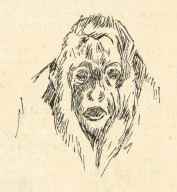
Phonozoic Text Archive, Document 129
Barnet Phillips
A Record of Monkey Talk
Source: Harper's Weekly Vol. 35 (1891),
No. 1827, p. 1050. Illustrations from p. 1036.
The character
transcribed as õ is actually a short vowel, not supported by html.

WHEN I was a child, seated on my great-grandam's knee, she told me of the Hessians that she had seen marching through Philadelphia streets, and also of a monkey that she once saw in Surinam, whose business it was to carry pails of water on its head to an exacting Dutch housewife. My patriotism might have been latent as far as the Hessians were concerned, but my curiosity in regard to monkeys probably dated from that early age. My mind, it may be said, has always been in a tabula rasa condition, prepared to accept at least this much, that monkeys were not to do things "out of the way," but in the way, of humanity. When, upon what I believe to be the most unimpeachable authority, I am told that Sally, the chimpanzee of the London Zoo, when she held ten straws in her hand, and you asked her for seven, would take away three, and unhesitatingly give you the remainder, after the first mental stagger I accept Sally as the developing simian arithmetician. I have lingered for a long time over a certain page in one of Miss Bird's books of travel, where she tells of dining in company with an ape or two somewhere in Malacca, and how the creatures behaved with singular decorum, with just as much propriety as well-bred children. The fact of the tempering of the strongest of animal instincts--that ravening greed for food common to brutes, and particularly to monkeys--made a strong impression on me. I was not, then, completely bowled over when Mr. F. S. Church, the artist, telegraphed me about as follows: "Come to the Zoo, and attend conversazione between Mr. Garner and monkeys."
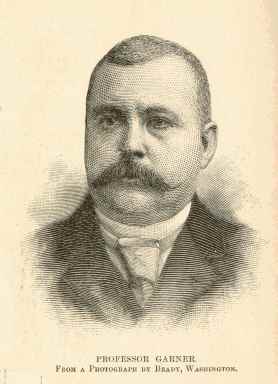
Curiosity was naturally awakened to understand first by what process of reasoning Mr. Garner had been led to the strange study of the existence of a series of distinguishable sounds peculiar to monkeys, by means of which they could communicate with their kind. The comic side of the situation, which always must assert itself, became secondary to the scientific part of it.
Evidently no one could undertake to handle such a subject without being an enthusiast, but there would be a wide distinction between the man contented to plod and another who, seeing much in the future, would be carried away, as it were, on the wings of his subject, floating into the realms of the unknown and unattainable.
If only on the threshold of finding out what might be the first articulate sounds uttered by apes, Mr. Garner's efforts are deserving of the highest praise. This was the question distinctly asked by Darwin: "From whence comes man, if not from the anthropoid apes?" To prove it, Darwin took what was the more tangible proof--the physical conditions. Here is a man from Virginia, some forty-four years old, who with infinite pains and patience is working backwards in another direction, one never before attempted. In archæology a splinter of flint represents the first tool primitive man may have used. Farther back than man, Mr. Garner is looking for the first understood syllable.
The many arguments, the pros and cons, in regard to the possibilities of a monkey vernacular, etc., will be forthcoming before long, but need not be presented here. If we accept the Darwinian theory, and should Mr. Garner's life work be accomplished, the advocates of evolution will have found a new and strong argument in their favor. Mr. Garner claims no priority of discovery as to the fact that animals use certain sounds for expressing certain emotions, for Darwin wrote, "Quadrupeds use their voices for various purposes, as a signal of danger, as a call from one member of a troop to another, or from the mother to her lost offspring, or from the latter for protection to their mother." Taking monkeys as a study, any comparative anatomist will tell you that the throat of the simian shows by laryngeal adaptation capabilities for sound vibrations, and even for singing. The gibbon may not be a vocalist adapted to Wagnerian requirements, but he warbles in his way, much to the disgust of men of sensitive ears who have followed him in the tropical jungle. Evidently the instruments are there, about as well keyed in monkeys as in birds, and nature never made any apparatus which was not to be utilized, otherwise in time atrophy must come.
Mr. Garner's approaches have been slowly made, and his self-preparation long. The man who proposes to untangle monkey chatter tells me of his hard work for years as a village school-master, where he paid most attention to the study of phonetics. He had been somewhat of an artist, and worked long with those undecipherable Mexican and South American hieroglyphics in the National Museum, endeavoring to interpret them. Trusting that certain profiles made by the aboriginal South American sculptors would give us the secrets of the glyphs, he delved deep into the study of human expression. Early in life, having been bred on a stock farm, he conceived the childish idea that horses had a language, and as a boy, though he had never read Dean Swift, he conceived the possibility of a Houyhnhums dialect. Many distinct and apparently diverging studies all focused, however, on this one point--the possibilities of formulating something intelligible to us from the talk of monkeys. Had they language? His mission was to understand it.
Some ten years ago, in the Cincinnati Zoological Garden, Mr. Garner sat studying a cage containing a mandrill and numerous smaller monkeys. The mandrill, the big baboon with the upholstered face, the most disagreeable creature of his kind, was the bully and torment of the smaller monkeys. The cage had a partition with an opening through which the smaller monkeys could escape, and a box into which they could retire. Tired of bothering the little monkeys, every now and then the mandrill would be quiet. Then a little monkey would peep out, give a certain cry, as much as to say, "The big brute is asleep now, come along, you fellows," and out would troop the small ones. The instant the mandrill began to annoy one of them, another and a different cry would be heard, and away would scamper the whole party out of his reach. But that was not all. There came suppressed cries from the hidden chamber, where the monkeys were huddled, and then no one budged.
"I sat hours by that cage," said Mr. Garner, "revolving that scene in my mind--the fright of the monkeys, their signalling, the difference of the vocal sounds. I was lost in a daze of thought. I never knew how long I sat there. That was years ago, and from that hour and day began this particular study."
The effort made first by Mr. Garner was to produce by our alphabet the sounds he head, and to memorize them. The difficulties were immense. The subjects themselves were not ready at hand. The toil was constant. He visited all zoological collections, and, as he expressed himself, "I am on speaking acquaintance with every monkey in the United States." Superintendents of Zoological gardens or keepers were not always courteous. For him to say, "I want to hear your monkeys talk," was sure to be met with a rebuff. Evidently the supposition was entertained that it was not safe to permit a man bent on such an errand in too close proximity with monkeys.
Desirous of familiarizing himself with monkey speech, Mr. Garner tried to form with letters some of the rudimentary sounds made by the monkey. "There is one sound, 'egck,' with a Polish terminal, which no letters will define. I have certainly repeated 'egck' five hundred times consecutively, with varying inflections, so as to get it right. Then there is an o- or a dominant sound monkeys make of õ õ preceded by a wh-, something like in 'whoo.' Now the old Saxon made a distinct w, not a vanishing w as we do. Make it wh-u-w, as an equivalent to a monkey 'oo,'" said Mr. Garner.
"It was terrible work to fix these sounds when I began. Results were often barely appreciable, even to a trained ear. The monkeys were not always inclined to give utterance to any sound. The most promising subject regarded me as a stranger, and would sulk. Monkeys, unless they know you, are not loquacious. I have at least one talent--unlimited patience. At last came the Edison phonograph. I was being shipwrecked, when this wonderful machine saved me. I spent a sleepless night when the possibilities of such a recording instrument were first mooted. I made use of it at once. It simplified matters. What I do now is to receive the sounds monkeys make on a cylinder. I may use a dozen cylinders and only get one worthy of preservation, but when I do get that one I think a day or a week not wasted. Having a good cylinder record, I take it to my study. Then at night, when all is still and quiet, I listen to its sound. I may have the same cylinder turn for me hours in a stretch. I cannot always isolate one monkey. I have many sounds imparted to the same cylinder. I analyze them all. Having such a collection of monkey talk, I have been able to classify it. At once I must say that too much is not to be expected of a monkey. I am not to create what does not exist. The gamut a monkey has is limited. The expressions he uses, indicative of his wants or his emotions, are but few. He has no ideas on the tariff, silver, or civil service. What I believe he says may be equivalent to these expressions: 'I am hungry,' 'I am thirsty,' 'Watch out, now,' 'I am frightened,' 'I would tear you to pieces if I could.'
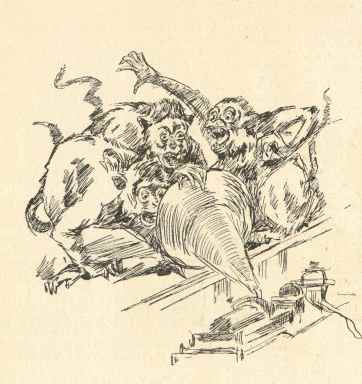
"These are not phrased, of course. Man was highly developed when he strung words together. A single sound expressing something suffices a monkey. He may intensify his different calls according to varying conditions. He may be comparative or superlative with his 'egck,' or his 'w-h-o-o-w.' Now I insist that by your ear, as imparted by means of the phonograph, you will hear that monkeys in St. Louis or in New York of the same species say precisely the same things over and over again when they are hungry, thirsty, or afraid. That much, at least, lays something like a positive foundation for future study. Who shall say to me that the mental development of all monkeys is the same? Have I exhausted monkey individuality? Take the common, ordinary monkeys--for instance, the Rhesus. They may be the Bushmen of their race. Why should I not find in the chimpanzee the Aryan, the highest development? What is to prevent educated simians, as were the late lamented Sally and Crowley, from having more distinct or enlarged or complicated qualities of speech expressive of new wants? May I not expect from long groping in the dark to come later on to a more luminous condition? That is where I shall try to get to."
Mr. Garner's manner in saying this much was cool and quiet. There was not the hardness of the man who sought what was an abstraction; there was neither dogmatism nor asseveration. The basis of scientific research was present. He had, he believed, found the clew, and he would follow it to the very end.
The time for the experiment at the New York Zoological Department at Central Park was early in the morning. Acting on the general broad principle that a bird who will not sing must be made to sing, hungry monkeys, impatient for breakfast, were the most likely to say something in Garnerian equivalent to "Hurry up them cakes." Mr. Garner, Mr. F. S. Church, Mr. Conklin, and the writer were assembled in the monkey-house. Mr. Garner's back was toward the largest monkey-cage, and he held in his hand a ruddy apple and a knife. "You will notice that some one of these Rhesus monkeys will certainly try and signal me," said Mr. Garner. "Some one will utter his distinct cry for food later on, but it will be preceded by something else."
We all listened. Then there was heard a series of sharp taps on the floor of the cage. A monkey was rapping. He seemed to do it in three taps with his little clinched fore hand. Then the cry began. They did not all of them ask for apple, for there was one very greedy monkey, who was the most importunate, and he kept to the front and tried to bully the others. Sometimes three or four would cry; then they would cease, and the tapping at the floor would begin again. At last the apple, cut in small bits, was given to the monkeys, and the call for food was continuous. One small apple among so many was hardly a snack, but the monkeys' appetites were whetted. Now the phonograph was brought into play.
The monkeys did not seem to mind the apparatus. It was apple they were after. Perhaps if less keen set, the brass funnel with its open mouth might have frightened them. More apple was given them, and their replies, directly over the big recipient of the phonograph, were recorded on the revolving cylinder.
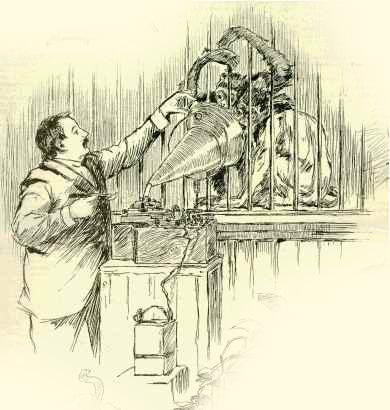
It was a Barmecidian feast, but satisfactory, at least to Mr. Garner, for a cylinder was obtained. Next in order was the recording of the monkey sound for thirst. Jake, the keeper, poured out milk into the pan in a niggardly manner. The twitter the monkeys made was a less positive sound than when the apple was visible. The whole company had, however, either recognized the milkman with his tin can, or had smelt the milk. The poor little chaps rushed to the pan, where there was barely enough for one, and now a clutter of monkeys, like Oliver, cried for "more." At once the phonograph was put in position, and a second page in the simian vocabulary was set up in sounding type. The final chapter was a copy in short-hand of monkeys in a tip-top rage. A few passes made by the keeper sent the whole cage into an ecstasy of passion. The creatures screeched, raved, scolded, and their bad temper seemed infectious, for distant monkeys participated in the row, and bounced about, and were in paroxysms of anger. The revolving cylinder took in all the clamor in an unruffled manner.
Presently all was quiet. "At least in studying the monkey I have discovered this," said Mr. Garner: "he is a prey to transient emotions. With most of them anger lasts but a moment. A monkey will pass from one feeling to another with the utmost rapidity. Fixity of purpose is somewhat wanting. You will notice that we are all his good friends just now. They might be mad with me one moment, and friendly with you the next, and change just as suddenly. But this they seem to want in their captivity--somebody who would be good to them, to protect them. They have what might be designated as receptivity for kindness, but do not in their brains know how to return it--that is to say, among the lower grades of simians.
After the apparatus and cylinders had been removed and carried to Mr. Conklin's office, and we were getting better informed, an Italian entered who was in want of a monkey for the organ-grinding business. He was short, squat, chunky, and had the perfect padrone make-up. His English was the accepted lingo of the comic Italian. At once, for his special benefit, a particular cylinder was put in the machine, and across the room by means of the funnel came the sounds. The Italian's beady eyes sparkled; his big mouth, his square white teeth, were disclosed. He looked amazed, and simply said, "Monk-he mad." It was the cylinder which had recorded monkeys on the rampage. On all the cylinders Mr. Garner first dictates the date and the character of the experiment. Thus on this particular one there was: "New York, Dec. 16, 1891. Central Park collection. Cage of Rhesus, capucine monkeys. Cries of temper."
The day before, as Mr. Conklin and Mr. Church told me, a pretty experiment had been made. The hunger cry of the monkeys, the regular denizens at Central Park, had been taken. A batch of brand-new monkeys had been bought some days before, and they had not been put in the regular monkey quarters, but in another room. The cylinders were turned before the new-comers with the hunger cry, and at once all the strangers understood it, and began to beg in their turn, making all the sounds and gestures of famine.
The common school of monkeys in the United States Mr. Garner has exhausted. How does he propose to sit down as a humble student at the feet of the more distinguished of the simian race, and familiarize himself with their wise utterances? What academic grove will give shelter to this new disciple? To change metaphors, Mr. Garner proposes taking the bull by the horns. He is going to track the gorilla to his lair, to follow the chimpanzee to his native fastness. It is in Africa, the Gaboon River, the stamping ground of Du Chaillu, where Mr. Garner is to begin his graver work. His preparations are being made. At present such time as he has at his disposal he is devoting to the study and perfecting of his equipments. He has had built a cage seven feet square, made of light steel bars, in which he is prepared to ensconce himself, and there await developments. His idea is to lure (if he can) a gorilla in the proximity of a phonograph, and to get him, without his knowing it, to talk into the funnel. The chimpanzee is to be baited to soliloquy.
"It will take a passionate patience to do all I propose doing," said Mr. Garner. "I shall stay so long in the haunts of the chimpanzee that he will not be afraid of me. I trust to get on speaking terms with him. Before he knows it, I shall have his original native discourse in chimpanzee, pure and undefiled. More than that. With the actual scientific apparatus I shall take with me I will not only record his voice, but by electrical communication will snap a camera on him. I shall photograph him just as he is, free, never having been cramped by confinement, and capture him afterwards if I can. But there is one thing more than that. Say I have in my cylinders the sounds the gorilla or the chimpanzee make. Is that all? Granted that I have got to the bottom of monkey talk, my task would be but half accomplished. I have but forged a single link in the chain. I want another. I propose taking down the speech of the lowest specimens of the human race--the pygmies, the Bushmen. Perhaps men will be less amenable to reason than apes. The phonograph will record the variations of human speech, impossible to obtain otherwise. At least I can get the Hottentot cluck and click. If there be family resemblance, structural relationship, between the Rhesus monkey, the chimpanzee, and the lower grades of humanity, there may be correlation of speech, philological kinship, and then--and then--the origin of man's talk might be found."
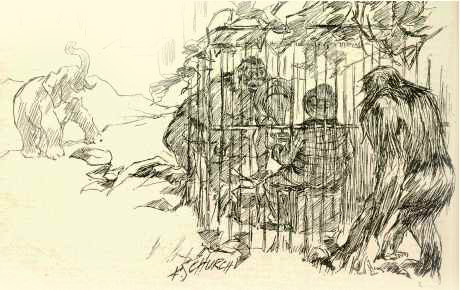
There was something grewsome in a surmise like this--the further pinning down of humanity to his anthropoidal apish origin; but it was not said in an airyish or irreverent manner. Then somebody who wanted to flaunt his erudition said:
"And what's to become of the Max Müller business about Sanskrit? As a lover of dogs, I never quite forgave him sitting down on the imitative source of language, and killing the bow-wow theory."
Then somebody else remarked, "Why, don't you know that monkeys are sacred in India, and may they not be revered because a lost tradition had made them the source from whence language sprang?"
"And that," said the artist, sententiously, "only increases my respect for the monkey."
It all seems like a Jules Verne excursion into the animal kingdom; but with a man as a directing spirit who will go to Africa, taking with him all those scientific implements which have positive and practical effectiveness, much may be expected. No one can know what Mr. Garner may not accomplish. He may advance only by one footprint into the realm of the long past, where all has been heretofore hazy, confused, indistinct. Certainly he is a brave man who has the courage to try and solve nature's greatest mystery.